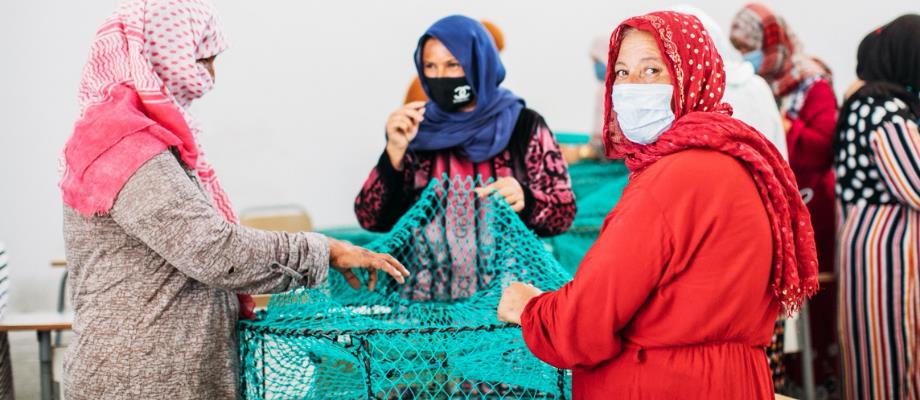Decent work in Tunisia: women in small-scale fisheries

Women in the informal sector
In Tunisia 32.4% of women and girls live in rural areas. They represent 50.4% of the total rural population (Government of Tunisia), therefore, they are considered as key development actors and play a strategic role in national food security. Women in rural areas face greater difficulties than their male counterparts in accessing education and information, social protection, resources and factors of production, markets, financial services, and technology (FAO,CTA et FIDA (2014)).
Women involved in artisanal fishing are generally considered as agricultural workers. And although some of them are boat owners, most of them work in precarious conditions due to the lack of adequate social protection mechanisms that meet their needs.
Traditional norms and stereotypes are more entrenched in rural areas, resulting in very limited inclusion of rural women in local governance and limited decision-making power within their families (ADB, FAO. (2013)). Besides, workers in the informal sector are generally not covered by the Labor Code.
Decent work through public policies
Recently, Tunisia has taken steps to improve the legal protection and economic empowerment of vulnerable categories of workers, particularly rural women.
Indeed, in the MENA region, Tunisia is the only country that has a specific strategy and action plan in favor of rural women and girls, under the leadership of the Ministry of Women, Family, Children and Seniors. The third axis of this strategy is based on the social empowerment of women: fight against school dropout, access to decent work and improving basic health services.
The Ministry of Agriculture, Hydraulic Resources and Maritime Fishing (MARHPM) is also involved in the implementation of this strategy through the Rural Women's Support Office, which is attached to the Minister's cabinet.
FAO supports local initiatives
As a part of its Decent Work Agenda and its technical expertise in economic empowerment of women workers in the artisanal fisheries sector, the Food and Agriculture Organization of the United Nations (FAO), has significantly contributed to improving working conditions of women clam collectors throughout the Tunisian coast. Through technical assistance projects that have targeted this particular category of women who are the most vulnerable in the fisheries value chain.
FAO has tried to support decent work for women collectors through:
- The provision of working and protective equipment for women clam collectors (boots, gloves, etc...)
- The improvement of the working conditions in situ by constructing shades so that the women collectors can rest while waiting to sell their products
- The identification of new employment niches (product processing, manufacture of fishing gear, handicrafts, etc.)
- Capacity building for women to support them in launching new alternative income-generating activities
- Supporting professional organizations and creation of productive alliances
Tunisia has been able to distinguish itself from other countries in the MENA region in terms of economic empowerment policies for women, but there is still a long way to go to guarantee decent working conditions for women workers in the artisanal fisheries sector.






